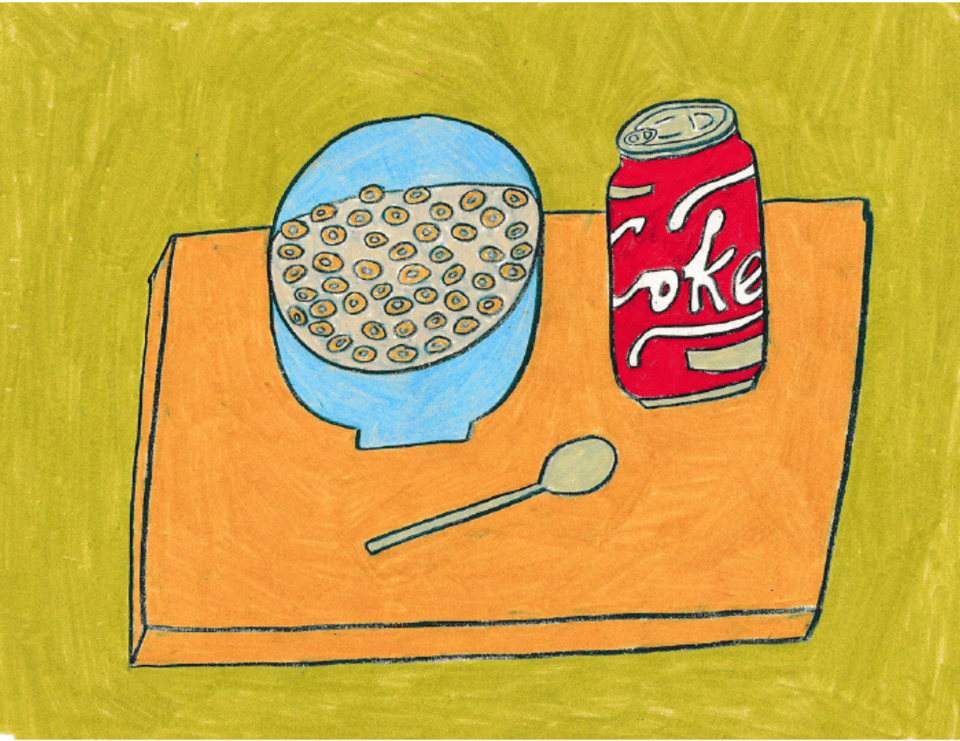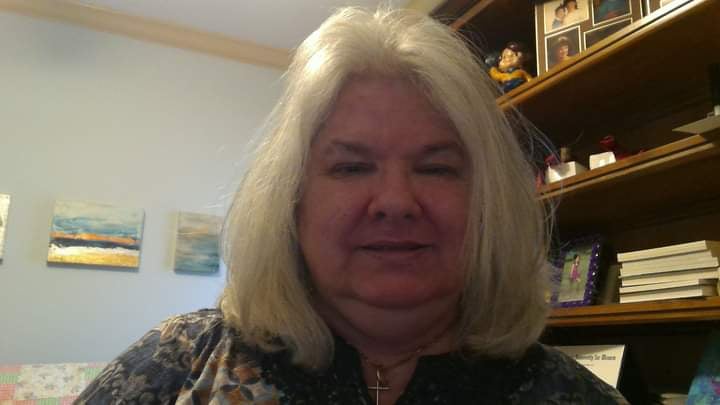January 7th: Julie L. Whitehead

My mom passed away twelve days ago. It hasn’t hit me yet. So I’m moving forward like any other day. What else am I going to do?
I roll out of bed and stagger up front to the kitchen. My husband is already eating his bowl of Honey Nut Cheerios covered with two-percent milk while he watches the Today Show. I go into the kitchen and fix my own bowl and sit at the kitchen table.
Oops. Forgot my Coke. Can’t function in the morning without one.
When I was living at home, my mom got up every morning at five a.m. and cooked a homemade breakfast—scrambled eggs, homemade biscuits, homemade dewberry jelly, bacon. When it was ready, my daddy would come and rap on my door to wake me up so I could go eat.
I’ve never been able to wake up that successfully in the morning to pull such a breakfast off. My kids were raised on Pop Tarts, breakfast cereal, granola bars, or fruit bars.
Once a long time ago I made waffles for my husband on a Saturday. He batted my hand away when I shook his shoulder and rolled over and went back to sleep. Threw them away—gave away the waffle iron. Never again.
I pull my mind out of my memories and go get ready for the day—clothes, medicine (so much medicine), contact lenses, combed hair. I get to dress down nowadays--I’m a fully remote worker now for a university press. Haven’t worn makeup on a regular basis since the pandemic.
When my mom was working, she didn’t set foot outside her house without her coiffure, makeup, color-coordinated outfits (which she often sewed herself), and shoes being just right—as right as she could get them on a schoolteacher’s salary.
Going into my office is going into my second favorite room in the house. The area is pure me—Peanuts trinkets on my desk, professional memorabilia on my walls—degrees, awards, plaques—and oodles of books. (My mom taught me and my sister each to read by age three. Who does that anymore?)
I try to get to work following the marketing plan to publicize our upcoming titles at my press. I create news releases, research and compile lists of publicity avenues to mail review copies to, filing reviews in our electronic database, creating blog posts—all kinds of tasks that we use to try to get our books out into the world.
It’s not hard work. But lately I’ve been struggling with concentration and attention, wanting to do other things rather than work. It’s been going on for a while, and neither my psychiatrist nor my therapist can give a good solution to the issue. I’ve already been through the ropes of trying to diagnose if I’m ADD, ADHD, autistic, or some other spectrum variant. Maybe my bipolar disorder is scattering my attention. I try not to think too much about it and just soldier on. (All my life I have pushed through crisis after crisis, challenge after challenge. It’s all I know how to do. I learned by watching my mom—she buried two parents, three brothers, and two sisters-in-law over the span of my lifetime.)
My cleaning service arrives at nine. My husband Bob is so allergic to everything: trees, pollen, dust, dust mites, animal dander, strong scents, mold—you name it, it makes him sick. So we have cleaners who do a much better job than I could ever do. (We tried for years once mom first got sick to get her to hire help. She tried, I’ll give her that. But she ran them off—she followed one girl around, pointing out everything she did wrong, and with the other, she kept her mouth shut but cleaned up behind her after she left.)
At nine-thirty, I go into a Zoom meeting. We’re brainstorming ideas for what could be done to help certain books that aren’t doing very well. I speak very little—I’m not on the strategy-setting team; I’m in implementation. So I sit and listen and try to learn more about the job.
Bob calls at ten a.m. on the dot. We established this pattern early on after I was diagnosed bipolar. He said he wanted to know what he was coming home to during lunch and after work. He’ll call again around three p.m. We usually talk politics, office talk, how are you doing? But today I told him I was in a meeting.
Once the meeting finally ends a little after eleven a.m. I head to the kitchen for lunch. Ham sandwich on wheat bread, pringles chips, another can of Coke. A chocolate chip cookie after—my favorite kind. My mom finally stopped buying chocolate chip cookies when I was maybe in middle school. I’d go and sneak one or two out of the package whenever I got hungry and could clean out the package in a day if she let me. But my belly was getting too big to fit into that year’s blue jeans. So no more cookies. Now I eat chocolate chip cookies whenever I want, and I’m a hundred pounds overweight.
I go back into my office after lunch and continue working, but that dang attention span is cutting out again. I resist the urge to call my daddy to see how he’s doing. I don’t want to bother him, but I don’t enjoy the thought of him just sitting in the house atop that red clay hill in north Mississippi staring at the walls with only the TV for company. But I’ve got work to do.
At 12:45 p.m. Bob comes home for lunch. He fixes his own ham sandwich, and I come out of the office and talk some. The news is still speculating that Assad may have been poisoned while in exile in Russia (couldn’t happen to a better person) but are starting to say it’s disinformation because independent sources won’t confirm it. So that’s yet another thing we will never know the truth about.
After Bob leaves to go back to work, I reluctantly go back to my office. Only two hours left to work. But my youngest daughter comes down from her upstairs bedroom and wants to talk. She’s still home, off from university for the Christmas holidays. So I turn my desk chair around and she stands in the doorway (because she only means to chitchat a bit) but our talk stretches on for a while—she talks about her classes and professors, and I talk about when I was in school (in the Pleistocene Era) and when I taught college as well during her lifetime, for encouragement and to show her how good she has it now, like all parents do to their young ones.
Finally the phone rings again and I chat with Bob this time, while signing off my job in a bad mood. I barely accomplished anything today, and I’m so frustrated with myself. I want to do a good job, but—I’ve lost the plot on why I want to work in the first place: to stay busy and bring in money for the household—even though we don’t need my money. But it just makes me feel good to work. My mom worked most of my life and taught me that if you want anything, you have to work for it.
I leave my desk and run errands for my upcoming trip on my book tour: a library talk in a small north Mississippi town. I wrote a book a couple of years ago titled Hurricane Baby: Stories and released it last year through Madville Publishing in Texas. So I go refill some of my many medications, stop by the grocery store, then come home and get ready for dinner.
It’s cold—or what passes for cold in Mississippi– low forties. I cook chili for supper and am halfway through when Bob comes in. I’m in a hurry because I’m also doing a podcast tonight for my book—a guy I know has a YouTube channel with a reasonable reach, so we’re going to talk tonight at seven p.m.
We sit in front of the news and eat dinner, as is our habit. Bob, me and my daughter, who barely eats because she knows everyone in the family is fat and she wants to not be that way. My mom lived on lettuce, tomatoes, carrots, and Thousand Island salad dressing my whole life for the same reason. By the end, my daddy could pick her up and put her in her seat in the truck until his back finally gave out for good a month before she died.
After dinner, I go into my office and set up for the podcast with Alec. Once he opens the Zoom link up for me, he stumbles through an offer of condolences for my mom’s death. I try to put him at ease, but I can tell he’s still nervous as we start recording.
He’s asking questions about my writing and how I became a writer, and I can’t stop talking about how stupid my mom thought my whole ambition to write for a living was. It’s a running theme throughout the conversation how so many people in my life, particularly her, really tried to talk me out of it or otherwise discouraged me. I don’t like talking like this about my mom, but it was true, and I’ve always been taught to tell the truth.
We finally move into talking about the actual book, and it happens again—I start comparing one of the main characters, Wendy Sue Magnum, to my mom: how she was a tough, working-class Southern woman. My mom would never have done what Wendy did in the book, but that’s neither here nor there.
After the interview is over, I feel really drained. I am not going to try to write any more like I usually do at night. I go and soak in the garden tub for a long time, trying not to think. But of course I do. I hope Mom got some use out of those bath salts we gave her for her birthday in September.
Finally I climb out, put on a light nightgown; my mom loved warm pajamas in pretty colors. I take all my night medicines and finally go to bed.

Julie Liddell Whitehead lives and writes from Mississippi. An award-winning freelance writer, Julie covered disasters from 9/11 to Hurricane Katrina throughout her career. She writes on mental health, mental health education, and mental health advocacy. She has a bachelor’s degree in communication, with a journalism emphasis, and a master’s degree in English, both from Mississippi State University. In August 2021, she completed her MFA from Mississippi University for Women.